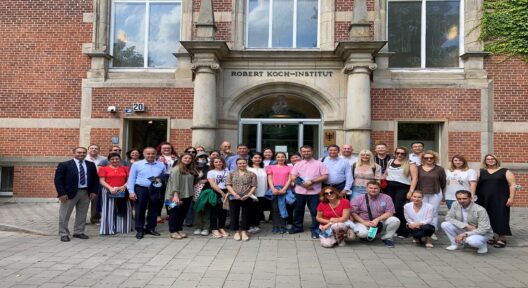WASP
Western Balkan Strategic Partnership for Health Protection

Context
The COVID-19 pandemic put a heavy strain on many public health systems, which had to deal with high numbers of severely ill people and deaths and with challenges regarding vaccination and medical supplies. The Balkan region was seriously affected by the pandemic, highlighting the importance of strengthening preparedness and response to infectious disease outbreaks. WASP builds on the work of previous GHPP projects, which fostered networking among national institutes of public health (NIPHs) (GETPrepaReD), assessed the effects of the COVID-19 pandemic on AMR surveillance, prevention and control (ARGOS), strengthened population health metrics data (BoCo-19) and offered training on intensive care treatment for COVID-19 patients and on SARS-CoV-2 laboratory capacity (CORRAL). WASP further strengthens public health core capacities in the Western Balkans in the field of epidemiological preparedness and response. In this endeavour, it focuses on the public health workforce in the region, providing training to NIPH staff, on strengthening molecular laboratory capacities and on disease prevention and control. Ultimately, this will result in more targeted public health decision-making the whole population will benefit from.
Objective
Strengthening the national epidemiological preparedness and response capacities of Western Balkan countries to tackle infectious disease threats.
In Cooperation With
- Institute of Public Health (IPH), Montenegro
- The Clinical Center of Montenegro (KCCG), Montenegro
- Institute of Public Health (IPH), Albania
- Institute for Public Health (IPH), Federation of Bosnia and Herzegovina, Bosnia and Herzegovina
- Public Health Institute (PHI), Republic of Srpska, Bosnia and Herzegovina
- National Institute of Public Health (NIPH), Kosovo
- Institute of Public Health (IPH), North Macedonia
- Faculty of Medicine, University of Belgrade, Serbia
- City Institute of Public Health Belgrade, Serbia
Thematic priorities
Facts
Activities
-
Training and competence development
Deepening and expanding the knowledge of health personnel on intensive care medicine; training laboratory staff in diagnostic testing and genomic sequencing; training health personnel in the clinical management of patients with antibiotic-resistant infections
-
Capacity development
Strengthening national epidemiological preparedness and response capacities by developing documents such as guidelines and conducting workshops and training; establishing a monitoring system for improved surveillance of dynamic outbreaks within and across countries using population health metrics